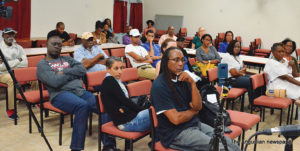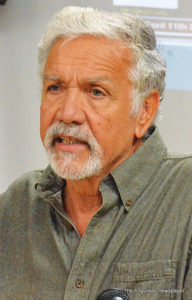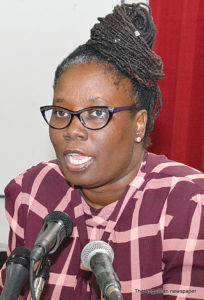 Advocate for climate change awareness, readiness and action in Anguilla, Mr. David Carty, has stressed that, like the boldness exerted by the leaders of the 1967 Anguilla Revolution, the current leadership should agitate for climate change funding.
Advocate for climate change awareness, readiness and action in Anguilla, Mr. David Carty, has stressed that, like the boldness exerted by the leaders of the 1967 Anguilla Revolution, the current leadership should agitate for climate change funding.
Stating that Anguilla is at risk from the dangers posed to the environment by climate change, Mr. Carty was at the time delivering an address at the Teachers’ Resource Centre on April 11, 2019. It was in connection with a research paper he delivered during the 2017 Country Conference sponsored by the University of the West Indies.
The event was the Third Anguilla Country Conference Community Engagement Session on the Environment, Tourism Development and Conservation Threats. The other main speaker was Ms. Gina Brooks who spoke on behalf of herself and Dr. Aidan Harrigan (who was not present). Both of them had delivered research papers at the 2017 Country Conference and, like Mr. Carty, were involved in last week’s third engagement session.
In calling for a serious official approach to the negative effects of climate change on small tropical islands, like Anguilla, Mr. Carty said: “The reason the Anguilla Revolution was so successful was because the Anguillians of 1967 were bold,” he stated. “If they had made a miss, nooses would have been around a few necks because, technically, all the leaders of the Revolution had committed the crime of sedition or treason – punishable in 1967 by death. My point is that you need to take that spirit of 1967 and be bold [about climate change funding]. You can’t have a Chairman of the Energy Committee, like I was, or even the CEO of Anglec, going somewhere for discussions.

“You have to go from the highest level – and this is an argument I had with the British Government when I was Chairman of the Energy Committee. I told a gentleman from the British Government, at the Governor’s residence, that I found it very pathetic the way the British Government was dealing with climate change in the Overseas Territories – particularly when they had bragged that they were the first country on the planet to pass climate change legislation.”
Mr. Carty went on: “What I have always said, and it has always fallen on deaf ears, is that policy-makers, at the highest level – and I am talking about the Governor and the Chief Minister down – need in all the bilateral discussions, with Her Majesty’s Government or anybody else, to belabour the point that climate change is real and Anguilla is at risk. We don’t want you to grant us money – but to lend us climate change funding at extremely discretionary rates.”
He stressed that policy-makers need to understand that the issue of climate change is going to eventually affect Anguilla hard, pointing to some of the present and threatening signs on the island. So intense are his feelings, about the need for climate change awareness and funding, that he was of the view that an argument in terms of reparations for slavery “includes helping us to deal with climate change.”
Carty declared: “I can make the case that trans-Atlantic slavery helped trigger the industrial revolution in the United Kingdom in 1750 – and the industrial revolution is what triggered the greenhouse problem we have today.” He made the point that the contribution to that problem, by small tropical islands, like Anguilla, is extremely minimal compared with that of large industrial countries.
He added: “I really believe that all of us love our children and this little rock is perhaps the sweetest country on God’s green earth. I think we owe it to ourselves to recognize that so much of the world is beginning to wake up on this issue – and that this thing is serious. Young people, in particular, need not to have to pay a hefty bill for our stupidity.”
Ms. Gina Brooks, who works in the Ministry of Tourism, looked at the first and second parts of the research paper which she, along with Dr. Harrigan, Permanent Secretary in the Ministry of Finance, presented at the 2017 Country Conference. She told the gathering: “The purpose of our paper was to examine the state of Tourism Development and Conservation, Threats and Opportunities in the context of Anguilla. The paper was divided into two parts with part one speaking to Tourism Development Framework and the Threats. It began at the time when Anguilla was regarded as a backwater of the Caribbean, and was virtually undeveloped with few employment opportunities. Part one of the paper went on to describe how the Government of Anguilla embarked on tourism development in the mid and late 1970s; the take-off of the industry since then; the creation of land and marine reserves and parks; and the development of land use planning controls, and a tourism policy.”

Later on, Ms. Brooks presented part two of the paper prepared by Dr. Harrigan. This highlighted, among other matters, the opportunities for conservation in tourism and the development of a number of tourism projects; various threats against the industry including hurricane activity, storm surge, the destruction of sand dunes and other threats.
The conclusion of Ms. Brooks’ two-part presentation was as follows: “One of the features of small islands, such as Anguilla, is that they have a very finite carrying capacity. Consequently, if the emphasis is on building more and more tourism accommodation rooms, inevitably there reaches a point where the island will have reached its absorptive capacity; and various negative impacts will threaten the very natural resources on which tourism is built. All we have in Anguilla are our seascapes which are really our landscapes. We need to cherish these vigilantly – making sure that the tourism structures do not destroy them. We hope that we have demonstrated that this needs to be the case; and that through conservation initiatives, such as establishing national parks, that such impacts can be prevented. Much remains to be done before the Cove National Park becomes a reality. However, with the commitment of all stakeholders, political leaders, government agencies, developers, residents of the local community, NGOs and community-based organizations, we are optimistic that the Cove National Park will indeed be realized as an oasis of green, white and blue in Anguilla’s western tourism belt.”
The engagement session of the 2017 Country Conference began with introductory remarks by Dr. Phyllis Fleming Banks, Manager of the Open Campus of the University of the West Indies in the British Caribbean Overseas Territories.
The Moderator of the event was Ms. Susan Hodge, Programme Officer for Community Outreach Preparedness and Education in the Department of Disaster Management of the Government of Anguilla.
The next Anguilla Country Conference is planned for October 23-25, 2019, under the theme “Communities at Crossroads: Change the Thinking, Change the Future”.








